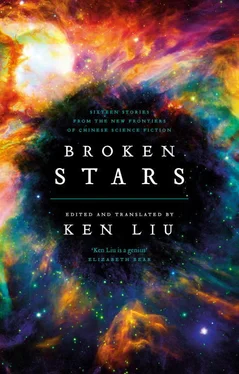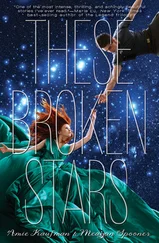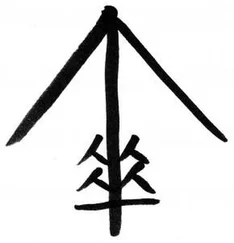The peasant children would stay in the water. Let them.
We burst through the surface, our hearts pounding. All around us were the hulking forms of anchored subs, like a pack of hungry, silent wolves in the deep of winter. Like freshly fallen snow, the crude, gloomy hulls reflected the bright sunlight so that we squinted. There were no fish on the surface either, just the drifting corpses of rats and cockroaches, and layers and layers of rotting algae, tangled with thousands of discarded phone chargers and computer keyboards, as well as soda bottles, plastic bags, and other trash. The stench from the feces-colored water was almost unbearable, and swarms of flies buzzed around, their heads an iridescent green.
This was, in fact, an unforgettable, lovely sight that made us linger, and we wondered if the subs had come here specifically to appreciate it. Their long odyssey had left them with a unique value system and sense of beauty. Peasant women busied themselves aboard the subs without gazing down at us in the river. They boiled their rice and cooked their meals with the stinking water we bobbed in, and yet, whereas the city-dwellers would have died from the germs, the peasants were fine.
Just then, anxious adults on shore hollered for us to come home, their faces filled with danger , frightful , menace .
*
The year before I started middle school, something happened involving the subs.
It was an early autumn night. Loud noises woke me from sleep, and it seemed as if the whole city had boiled over. My parents dressed me quickly, and we hurried out the door, heading for the river. We became part of a surging crowd whose thumping footsteps and worried cries were like exploding firecrackers on New Year’s Eve. I was so scared that I covered my ears, unsure what was happening.
Once we arrived at the shore, I found out that the subs had caught fire. The fire had spread and all the boats were burning. In my memory, it was like a major holiday: the whole city’s population seemed to be present, their numbed expressions replaced by excitement, screaming and talking as though they were watching a marvelous show. Trembling, I squeezed next to my parents and tried my best to get a peek through the sea of people.
Raging fire danced and leapt from the densely packed subs, swirling, spreading, expanding like the skirts of cruel flamenco dancers. Flickering lights from the flames lit up the skyscrapers onshore so that they glowed like the foliage of late autumn, until the whole scene resembled a fresh painting. It was a shocking sight whose equal I have never experienced again.
For some reason, none of the subs dived. It was as if they had all forgotten what they were. Floating still at the surface, they made no effort to escape as the ice-like fire devoured them one by one. I was certain there was some secret behind it, some indescribable mystery. I wondered if another fantastic fire was also burning underwater—somehow, the water molecules had all transformed into another substance, and the whole Yangtze River was defying the physical properties endowed by nature, which was why the submarines were unable to dive away from this fiery dance stage.
I thought of the children in their underwater cages, and my heart swelled with shock and worry. Turning my head, I saw my parents standing like a pair of zombies, unmoving, their eyes staring straight ahead like lanterns, their faces frozen. Other adults muttered like chanting Buddhist monks, but no one made any effort to extinguish the fire. They seemed to be there only to witness the death of alien creatures in the river, to watch as the uninvited guests achieved total freedom.
That night seemed to last forever, though I never once thought of death, only soaking in the poignancy and meaninglessness of life itself. I never felt sad or mournful, though I was sorry that I would never again be able to swim into that strange realm, to see sights that made my heart leap and my mind confused. A sense of unresolvable solitude gripped me, while I knew also that my own future would not be affected in any way by what I was seeing….
Morning finally arrived. Dim sunlight revealed lifeless hunks of blackened metal drifting everywhere on the river. In scattered rows, circles, clumps, they reflected the cold, colorless light, and the air was suffused with the decaying odors of autumn. The city-dwellers brought forth cranes to retrieve the wreckage of the submarines from the river and trucked the pieces to scrap metal yards. The whole process took over a month.
After that, no submarines came to the Yangtze River.
On Christmas Eve, on a New York street, the Cosmic Observer met a lonely old man who called himself Salinger. He was dressed in rags, sickly, cold and hungry, and on the verge of death. Yes, he was indeed Jerome David Salinger, the author of The Catcher in the Rye .
The Cosmic Observer decided to make him a subject of his study and took him into a McDonald’s, where the Observer bought him whatever he wanted to eat. As the embarrassed Salinger wolfed down his Chicken McNuggets and Filet-O-Fish sandwich, he told the Observer the story of his life.
After The Catcher in the Rye catapulted him to fame, Salinger retired to seclusion in rural New Hampshire. There, in the hills next to the Connecticut River, he bought about ninety acres of farmland. He built a cabin on top of a hill, planted trees and gardens over the property, and surrounded it with a six-and-a-half-foot chain-link fence connected to an alarm. He proceeded to live a hermit’s life there.
The site for his cabin was a picturesque, sunny spot that seemed untouched by progress. To live as a pretend deaf-mute hermit in a cabin away from people was, of course, the dream of Holden Caulfield—and as it turned out, also the dream of Salinger himself. Once he had settled into his cabin, he rarely went out. Visitors had to first contact him by mail or by passing a note through the gate; and if they were strangers, Salinger simply kept the gate shut, refusing even to answer them. He was seldom seen in public, and even when he drove his Jeep into town to shop for books and necessities, he kept conversations to an absolute minimum. When anyone tried to greet him in the streets, he turned around immediately and fled. His picture appeared only in the first three editions of The Catcher in the Rye , and thereafter, due to his insistence, the publisher had to remove the portrait. It was so difficult to find an image of him that a French newspaper once mistakenly published a photograph of Pierre Salinger, the White House Press Secretary, to accompany an article about the famous author. In addition, once he had become a household name, his writing slowed down drastically, and he hardly ever published new works.
The great American people were content with Salinger’s choice. In fact, if time’s trajectory had not been bifurcated due to Cosmic Observer’s observation, Salinger would have gone on living as a recluse until death from natural causes at age ninety-one. All in all, not a bad life.
Unfortunately, trouble came to the timeline just as he had hoped to disappear anonymously from the world—the fault of the Cosmic Observer. No one knows what the Observer intended, but as a result of his interference, the armed forces of the Democratic People’s Republic of Korea conquered the United States of America. The North Korean scientists did not rely on their primitive nuclear weapons; instead, they used the newly invented Quantum Reambiguator, which changed the topology of space-time and allowed anything to happen.
As a result, the invincible Korean People’s Army not only unified the Korean Peninsula, but also conquered the rest of the world. To be honest, the KPA really was an impressive army: disciplined, orderly, never looting as much as a single needle or thread from the conquered civilian populations. If there were no barracks in the conquered cities, the soldiers slept in the streets and left the residents secure in their houses. They were solely interested in liberating the entire human race, freeing both their bodies and minds. The world had been without hope of salvation, just as Salinger described in his book: capitalism was rotten through and through. Oh, how the people suffered from spiritual crises, and economic catastrophe followed economic catastrophe! Each day was worse than the day before, and the next day worse yet. The living envied the dead. Maybe this was why the great author had retired to his cabin in the woods—he was the only one who understood how bad things were.
Читать дальше












